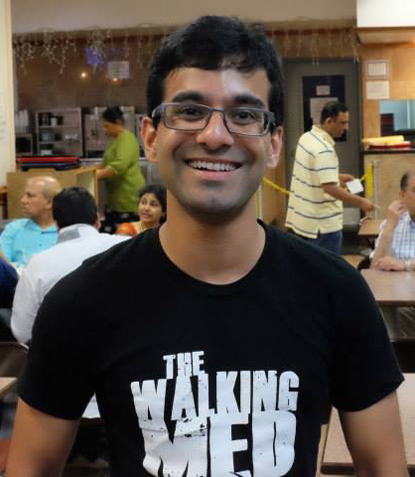

Growing up in Kolkata, India, Dipankan “Dippy” Bhattacharya enjoyed studying the sciences. But it wasn’t until he came to Berkeley — having moved to the Bay Area with his family at the age of 12 — that he discovered how deep science could go. “I had no idea that research was even a thing!” he laughs now. As a freshman in 2007, Bhattacharya applied for the Undergraduate Research Apprentice Program (URAP) and earned a spot in the lab of genetics and genomics professor Richard Harland — a spot he kept for all four years at Cal. “Finding the Harland lab was the reason I succeeded at Berkeley,” he says. “Research was like a fun puzzle for me — figuring out where the DNA’s mutation was, solving problems to uncover the next question. And the lab gave me a place to belong in the vastness of campus.”
But by his junior year, Bhattacharya felt something was missing. That’s when he discovered the Suitcase Clinic, which offers free student-run medical and social services for vulnerable populations through UCSF and UC Berkeley. It was there that Bhattacharya reconnected with his passion to work with kids, and a desire was sparked to go into medicine.
Today, he’s finishing his MD-PhD at Yale Medical School in the lab of Dr. Mustafa Khokha, who did his postdoc at the Harland lab. Both Khokha and Harland have been invaluable mentors, Bhattacharya says. “They’ve consistently pushed me to do the things that will advance my own path,” he says. “Without them, I simply wouldn’t be where I am today.”
Again, the interest in engagement has prompted him to get involved beyond his own studies. With the dean and another student he helped create the first course of the medical school’s new curriculum, one that teaches themes he’d originally learned at Berkeley. “We take all 100 incoming students on public transportation to homeless shelters and the veterans’ hospital,” he explains. “We also have the students shadow not just doctors but the nurses, chaplains, social workers, and other staff.”
Once he graduates in the spring of 2018, Bhattacharya will do his residency at an academic hospital like UCSF or Harvard. In the meantime, he hasn’t forgotten his Berkeley roots. Whenever he comes to campus, he tries be a “peer advocate” at MCB. He wants to help those coming up behind him to find the same success and joy that he has — from the lab to the broader community.




